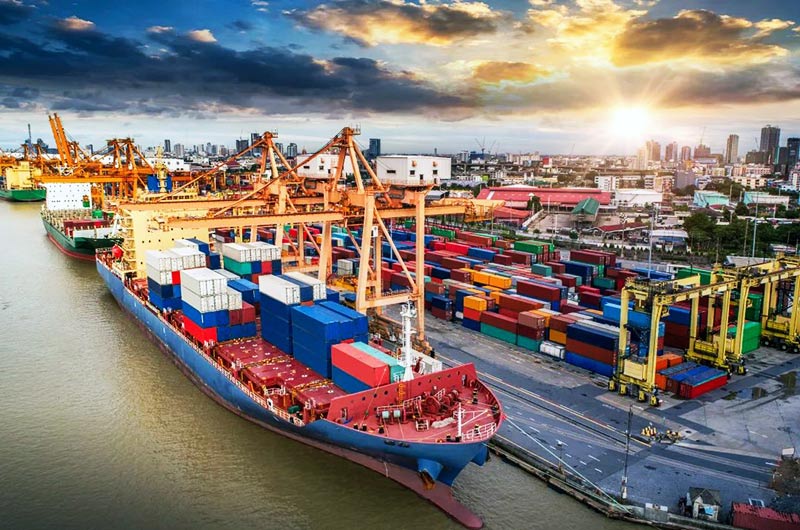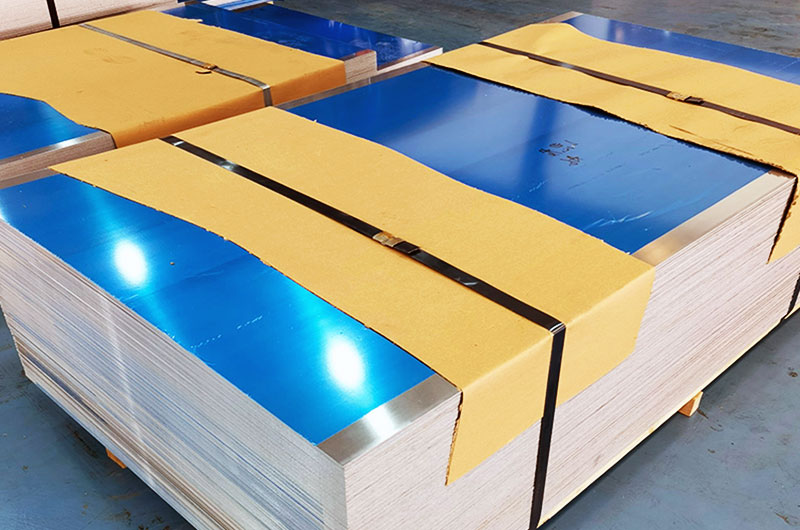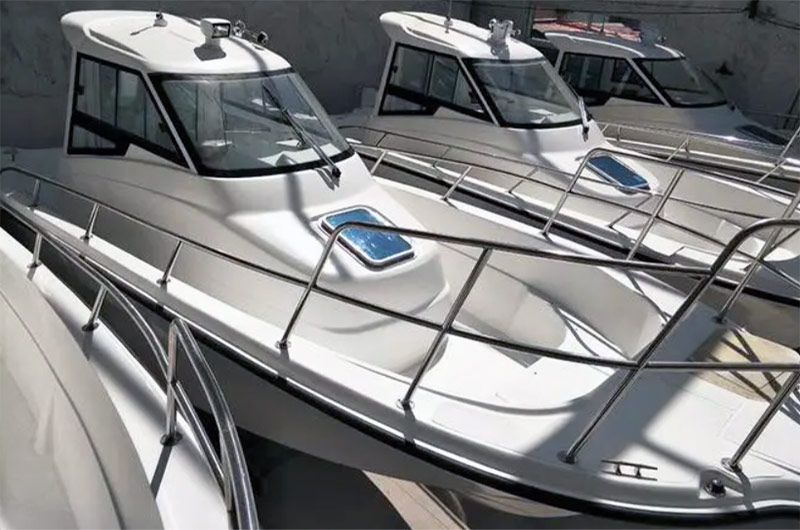Introduce Aluminum Plate Sheet for Boat Building
Shipbuilding is an ancient craft that has evolved tremendously over the years. Traditional materials such as wood and steel have been largely replaced by more versatile and durable materials such as aluminum.
Aluminum plates are a popular choice for ship construction due to their superior properties. This blog further explores the world of aluminum plate for shipbuilding, covering everything from material properties and manufacturing to its benefits and practical applications.

We'll explore the properties of aluminum and its various alloys, and why it's ideal for building ships. We will also discuss the manufacturing process of aluminum panels and delve into the design and engineering aspects of building ships using aluminum panels. Finally, we’ll highlight some key considerations and maintenance tips for aluminum boats.
Why Aluminum Plate Sheet for Boat Building?
1. Strength and durability
Aluminum is known for its excellent strength-to-weight ratio, making it a prime candidate for shipbuilding. It can withstand the rigors of the marine environment, including constant exposure to salt water, UV radiation and corrosion, without compromising its structural integrity.
2. Corrosion resistance
One of the most significant advantages of aluminum in boat building is its natural resistance to corrosion. This property is due to the formation of a protective oxide layer on the surface that prevents further degradation.
3. Lightweight nature
Aluminum is much lighter than steel, making it an attractive choice for lightweight yet strong ship structures. Lighter vessels require less propulsion power and can achieve higher speeds, greater fuel efficiency and better maneuverability.
4.Easy to process
Aluminum sheets are relatively easy to cut, bend and join, making hull fabrication and repair work easier and more efficient.
5. Weldability
Aluminum is highly weldable, allowing for complex and strong joints. This feature helps create complex boat designs, such as catamarans, with fewer seams, reducing the potential for leaks and enhancing structural integrity.
6. Thermal conductivity
Aluminum's excellent thermal conductivity helps dissipate heat, which is beneficial for ships with onboard machinery, electronics or engines.

Aluminum Alloy for Shipbuilding
There are a variety of aluminum alloys available, each with unique properties suitable for specific applications. In this section we discuss the most commonly used aluminum alloys in shipbuilding and their properties.
5xxx series
Common 5xxx aluminum plates are:
The 5xxx series alloys, such as 5052 and 5083, are known for their high corrosion resistance. They are often used in saltwater environments and we will examine their suitability for ship construction.
6xxx series
6xxx series alloys often used in shipbuilding include:
- 6063 marine aluminum
- 6061 marine aluminum
6061 and 6063 are known for their excellent weldability and strength.
7xxx series
The 7xxx series includes alloys such as 7075, which is appreciated for its high strength and lightweight properties.
Practical Applications of Marine Aluminum Plates
Different aluminum alloys and plate thicknesses may be suitable for different applications. Here are some general guidelines for the types of aluminum plates that can be used for the ship types mentioned earlier:
1. Cargo Ships
- Bulk Carriers and Container Ships: High-strength aluminum alloys like 5083 or 5086 are often used due to their good weldability and corrosion resistance.
- Oil Tankers: For oil tankers, 5052 and 5454 aluminum alloys are commonly used due to their excellent corrosion resistance and suitability for welding.
2. Passenger Ships
- Cruise Ships and Ferries: Passenger ships often use 5083 or 5086 aluminum plates due to their strength and corrosion resistance. Additionally, 6061 may be used for structural components.
- Ocean Liners: Historic ocean liners were often built with high-strength alloys like 5083.
3. Fishing Vessels
Trawlers, Longliners, and Crabbers: 5083 and 5086 are suitable for fishing vessels due to their corrosion resistance and strength.
4. Workboats
Tugboats and Pilot Boats: Workboats like tugboats and pilot boats may use 5086 or 6061 aluminum plates due to their strength and weldability.
5. Recreational Boats
- Sailboats and Motorboats: Recreational boats can use a variety of aluminum alloys, including 5083, 5086, and 6061, depending on the boat's size and design.
- Jet Skis: These typically use 5083 or 6061 aluminum for lightweight and corrosion resistance.

6. Yachts and Superyachts
Racing Yachts and Superyachts: The choice of aluminum alloy for yachts depends on design requirements and size, with 5083 and 6061 being common choices.
7. Naval Vessels
- Aircraft Carriers and Submarines: High-strength aluminum alloys, such as 7039 and 7050, are used for naval vessels, as they provide excellent ballistic protection and structural strength.
- Destroyers: Similar to aircraft carriers, naval destroyers use high-strength aluminum alloys.
8. Research Vessels
- Oceanographic Research Ships and Survey Ships: 5083 and 5086 are commonly used for research vessels because of their durability and corrosion resistance.
- Icebreakers: For icebreakers, specialized high-strength aluminum alloys designed for low-temperature and ice-resistant properties are used.
9. Offshore Platforms and Support Vessels
- Offshore Supply Vessels (OSVs) and Jack-up Rigs: These may use 5083, 6061, or specialized alloys designed for offshore applications.
- Floating Production Storage and Offloading (FPSO) vessels: High-strength alloys are typically used for FPSO vessels.
10. Ice-Class Ships
Icebreakers and Ice-Going Cargo Ships: Specialized aluminum alloys designed for low-temperature and ice resistance are used for these vessels.
11. Dredgers
Dredgers may require thicker plates, and 5083 is a suitable choice.
It's important to note that the specific requirements for aluminum plates may vary based on factors such as ship size, the environment the ship operates in, and design specifications.
Marine Aluminum Plate Manufacturing
1. Raw material extraction
The process begins with the mining of bauxite, the main source of aluminum.
2. Smelting and alloying
Aluminum is extracted from alumina through an electrolysis process.
3. Rolling and annealing
The aluminum metal is then processed through rolling mills to form thin sheets. Annealing is a heat treatment process used to improve the properties of materials.
4. Manufacturing quality control
Quality control measures are essential to ensure that the aluminum plates produced meet the standards required for shipbuilding.
Considerations for Using Aluminum Plate in Ship Construction
1. Material selection
Choosing an aluminum alloy suitable for marine use is critical. Factors that influence alloy selection include boat size, type and intended use.
2. Structural design
Aluminum's excellent strength-to-weight ratio enables innovative and efficient structural designs. Precautions vary for different types of boats, including monohulls, catamarans and trimarans.
3. Welding technology
Welding is a basic process in aluminum boat construction.
4. Surface treatment and coating
Surface treatments and coatings are critical to enhancing the durability of aluminum in marine environments. Protection measures include anodizing, painting and anti-fouling coatings.
Aluminum Boat Maintenance and Precautions
To ensure the longevity of your aluminum boat, proper maintenance and precautions are crucial.
1. Corrosion prevention
While aluminum is naturally resistant to corrosion, it is not completely immune. Methods to prevent and solve corrosion problems, including sacrificial anodes and coatings.
2. Routine maintenance
Regular maintenance is vital to keeping your aluminum boat in top condition.
3. Common challenges
Examples include galvanic corrosion and stress cracking.
4. Environmental considerations
Ship construction materials have environmental impacts.
Conclusion
Aluminum panels have revolutionized the boatbuilding industry, providing unparalleled strength, durability and versatility. Its unique properties combined with the right design and engineering make aluminum ideal for all types of vessels.
As the marine industry continues to grow, aluminum's role in ship construction is likely to expand further, making it the material of choice for shipbuilders around the world.

